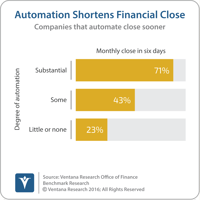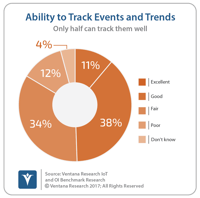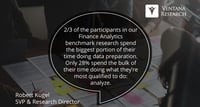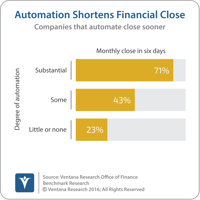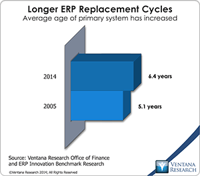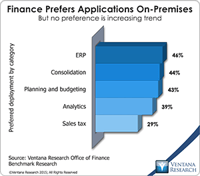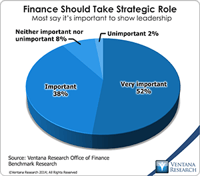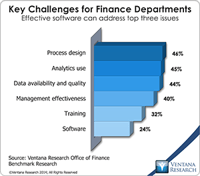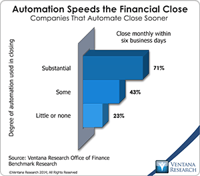Robotic process automation (RPA) relies on programming or the application of analytical algorithms to execute the most appropriate action in an automated workflow. RPA enables business users to configure a “robot” (actually, computer software) to interact with applications or data sources to process a transaction, move or manipulate data, communicate with other digital systems and manage machine-to-machine and man-to-machine interactions. This technology is gaining increasing notice by finance...
Read More
Topics:
Operations,
automation,
close,
closing,
Continuous Accounting,
finance,
banking,
Robotic Process Automation,
Accounting
The application of artificial intelligence (AI) and machine learning (ML) to business computing will have a profound impact on white collar professions. This is especially true in heavily rules-based functions such as accounting. Companies recognize the transformational potential of AI and ML, but the progression and pace of the adoption of these technologies is unclear. Some applications of AI and ML are already in use but others are a decade or more away from replacing human tasks.
Read More
Topics:
Big Data,
Machine Learning,
Office of Finance,
Analytics,
CFO,
finance,
CEO,
AI,
accountants,
NLP,
Accounting
Continuous planning is a term Ventana Research uses for a high participation, collaborative, action-oriented approach to planning built on frequent, short planning sprints. This enables organizations to enhance the accuracy of their plans because refinements are made at shorter intervals. Short planning cycles enable companies to achieve greater agility in responding to market or competitive changes. “Continuous” also means continuous across the entire organization – planning as an ongoing...
Read More
Topics:
Human Capital,
Business Collaboration,
finance,
Business
Kofax offers Kapow, robotic process automation (RPA) software used to acquire information from a range of sources without human intervention and without having to write code. These sources include websites, applications, unstructured documents, data stores and desktop spreadsheets. RPA software does repetitive, low-value work that otherwise may be performed by person. It saves time in these tasks, completing them sooner and freeing skilled individuals to concentrate on work that utilizes their...
Read More
Topics:
Office of Finance,
Operations,
close,
finance,
banking,
Digital Technology
Ventana Research awarded our Governance, Risk and Compliance (GRC) Business Innovation Award for 2016 to IBM for IBM Regulatory Compliance Analytics, powered by Watson (IRCA). This application of cognitive analytics is designed to streamline the identification of potential regulatory requirements and suggest methods for compliance. In so doing the cloud-based system can cut the time and cost of compliance while creating an effective means of ongoing management and control of compliance...
Read More
Topics:
GRC,
Machine Learning,
Office of Finance,
Dodd-Frank,
Risk Analytics,
compliance,
finance,
Financial Services,
Watson
The enterprise resource planning (ERP) system is a pillar of nearly every company’s record-keeping and management of business processes. It is essential to the smooth functioning of the accounting and finance functions. In manufacturing and distribution, ERP also can help plan and manage inventory and logistics. Some companies use it to handle human resources functions such as tracking employees, payroll and related costs. Yet despite their ubiquity, ERP systems have evolved little since their...
Read More
Topics:
Big Data,
Microsoft,
SAP,
Social Media,
Supply Chain Performance,
ERP,
FP&A,
Human Capital,
Mobile Technology,
NetSuite,
Office of Finance,
Reporting,
close,
closing,
Controller,
dashboard,
Reconciliation,
Operational Performance,
Analytics,
Business Collaboration,
Business Intelligence,
Business Performance,
Cloud Computing,
Collaboration,
Financial Performance,
IBM,
Oracle,
Uncategorized,
CFO,
Data,
finance,
Financial Performance Management,
FPM,
Intacct
Whatever Oracle’s cloud strategy had been the past, this year’s OpenWorld conference and trade show made it clear that the company is now all in. In his keynote address, co-CEO Mark Hurd presented predictions for the world of information technology in 2025, when the cloud will be central to companies’ IT environments. While his forecast that two (unnamed) companies will account for 80 percent of the cloud software market 10 years from now is highly improbable, it’s likely that there will be...
Read More
Topics:
Microsoft,
Predictive Analytics,
Sales Performance,
SAP,
Supply Chain Performance,
ERP,
Human Capital,
Mobile Technology,
NetSuite,
Office of Finance,
Reporting,
close,
closing,
Controller,
dashboard,
Tax,
Customer Performance,
Operational Performance,
Analytics,
Business Collaboration,
Business Intelligence,
Cloud Computing,
Collaboration,
IBM,
Oracle,
Business Performance Management (BPM),
CFO,
Data,
finance,
Financial Performance Management (FPM),
Financial Performance Management,
FPM,
Intacct
Many senior finance executives say they want their department to play a more strategic role in the management and operations of their company. They want Finance to shift its focus from processing transactions to higher-value functions in order to make more substantial contributions to the success of the organization. I use the term “continuous accounting” to represent an approach to managing the accounting cycle that can facilitate the shift by improving the performance of the accounting...
Read More
Topics:
ERP,
Office of Finance,
Reporting,
close,
closing,
Controller,
dashboard,
Tax,
Analytics,
Business Intelligence,
Business Performance,
Cloud Computing,
Collaboration,
Financial Performance,
CFO,
Data,
finance,
Financial Performance Management,
FPM
Our recently published Office of Finance benchmark research assesses a broad set of functions and capabilities of finance organizations. We asked research participants to identify the most important issues for a finance department to address in a dozen functional areas: accounting, budgeting, cost accounting, customer profitability management, external financial reporting, financial analysis, financial governance and internal audit, management accounting, product profitability management,...
Read More
Topics:
Mobile,
Planning,
Predictive Analytics,
ERP,
FP&A,
Office of Finance,
Reporting,
Self-service,
Budgeting,
close,
closing,
computing,
Controller,
dashboard,
Tax,
Analytics,
Business Intelligence,
Business Performance,
Cloud Computing,
Collaboration,
Financial Performance,
CFO,
Data,
finance,
Financial Performance Management,
FPM,
Microsoft Excel,
Spreadsheets
Our recent Office of Finance benchmark research demonstrates the importance of using automation to execute finance department functions. Information technology systems do at least two things very well that make better use of people’s time, and both of them can substantially improve organizational performance. First, they eliminate the need for people to do repetitive tasks, which frees them to spend time on more valuable work that requires judgment and skill. IT systems also can be programmed...
Read More
Topics:
Big Data,
Mobile,
Planning,
ERP,
FP&A,
Office of Finance,
Reporting,
Self-service,
Budgeting,
close,
closing,
computing,
Controller,
dashboard,
Tax,
Analytics,
Business Analytics,
Business Collaboration,
Business Intelligence,
Business Performance,
Cloud Computing,
Collaboration,
Financial Performance,
CFO,
Data,
finance,
Financial Performance Management,
FPM,
Microsoft Excel,
Spreadsheets
